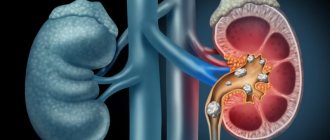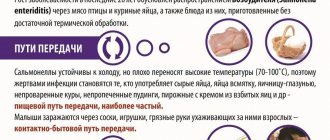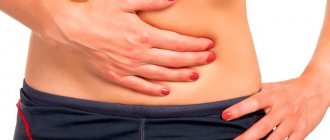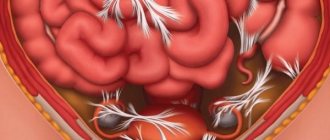Can diarrhea cause fever?
An increase in body temperature is a natural reaction of the immune system to the appearance of foreign particles in the body, an attempt to eliminate the source of inflammation.
If we talk about the connection between diarrhea syndrome and elevated temperature, we will talk about the inflammatory process that provoked intestinal disorder. Dysbacteriosis or overeating, which causes loose stools, does not provoke hyperthermia.
In most cases, these symptoms are characteristic of poisoning of the body. Body temperature can rise to 38-39°C. The problem manifests itself abruptly and manifests itself with severe pain in the abdominal area, the urge to go to the toilet, and fever. Diarrhea and a temperature of 38 in an adult indicate that treatment must be started immediately.
A temperature within 37.5 -37.9 should be alarming; it is typical for chronic conditions. A prolonged “borderline state” accompanied by diarrhea or constipation is a reason to consult a doctor.
Complications
In the absence of competent help, prolonged elevated temperature and diarrhea in an infant can cause various complications, including convulsions and loss of consciousness. Also possible:
- Intestinal dysfunction, constipation, flatulence.
- Dehydration is an extremely undesirable consequence, which in severe cases can be fatal.
- Lactase deficiency (due to rotavirus infection).
- Dysbacteriosis due to the use of antibiotics.
- Rectal prolapse due to untreated dysentery.
Causes and connection of symptoms
High fever and severe diarrhea in an adult may indicate the development of pathologies, the causes of which are associated with exposure to external irritants. Similar symptoms sometimes cause internal changes. The causes of hyperthermia in combination with diarrhea can be:
- ARVI. In this group of diseases, the most common causative agents of diarrhea accompanied by fever are influenza, rotavirus and adenovirus. Each infection has characteristic signs and general symptoms. Weakness, headache, runny nose, cough, joint pain, loose stools, fever are signs of malaise. Routes of infection: airborne droplets, household contact.
- Bacterial infections. Diarrhea accompanied by fever is possible with salmonellosis, dysentery and typhoid fever. The main manifestations of the disease are severe abdominal pain, nausea, vomiting, feces mixed with mucus, pus, and blood. Bacterial lesions develop rapidly. The temperature mark can reach 40 degrees. Bacteria enter the human body through unwashed hands, previously contaminated food, animals and people.
- Hepatitis A of viral etiology. The disease is characterized by high temperature, stool is liquefied and turns white. The condition lasts for 14 days until recovery and development of stable immunity.
- Nonspecific ulcerative colitis. The patient has intestinal upset, hyperthermia, pain in the lower abdomen, dizziness, and general weakness.
- Granulomatous enteritis is signaled by abdominal pain, biliary diarrhea, fever, loss of appetite and weight, and acute abdomen. On palpation, compactions are detected in the abdominal cavity.
- Appendicitis. The above symptoms appear with an anatomically abnormal location of the appendix. Over time, they will not go away, but intensify.
- Disorders of the gallbladder.
- Pancreatitis as a result of alcohol poisoning.
- Allergic reactions to certain foods. The main manifestations include rash, redness, and swelling.
- Poisoning with toxic chemicals.
- Drug overdose.
- Effect of radiation exposure.
The reasons for the combination of “diarrhea + hyperthermia” are different. To clarify the source of the disease, a medical examination, diagnosis and tests are necessary. In some cases, the patient may require urgent surgical intervention. Consequently, delaying the provision of assistance is dangerous for the health and life of the patient.

Diarrhea, vomiting and weakness in a patient: how long does it take to treat?
It all comes down to the reason why the patient fell into such a state. The maximum treatment can last 11 days, but this is when you suffer from dysbacteriosis. Therapy for gastrointestinal infections lasts from 11 to 65 days. Poisoning will be treated for a maximum of 15 days, this does not include the rehabilitation period.
Treatment
Therapy is necessary to eliminate this unpleasant situation.
Most likely, the doctor will prescribe:
- Antispasmodics.
- Anti-inflammatory drugs.
- Antibacterial drugs.
- Strengthening drugs.
Therapy using methods from the people is also allowed:
- Melissa for nausea: 4 teaspoons of lemon balm should be poured into a thermos or thermal mug and pour two liters of boiling water over it, the infusion should stand for about 4 hours. Take half a liter 4 times a day before meals.
- Tincture of pink radiola. It helps perfectly with any poisoning. Take seven drops three times a day until 7 pm.
- Herbs: take equal parts plantain, St. John's wort, mint, agrimony, chamomile and make a regular infusion of these herbs. Pour half a liter of boiling water and leave for half an hour. Take 3 tablespoons every hour.
- Chicory: 1 tablespoon dried herb and chicory powder. Pour a glass of hot water and leave it in a thermos overnight.
Remedies that absolutely help with nausea:
- A pinch of salt should be poured into the vodka, stirred and drunk. After which you need to drink a glass of orange juice.
- Pour one teaspoon of baking soda into a mug of water, then stir and drink.
- Regular green tea is one of the best remedies for nausea and vomiting.
- There are a number of points on the human body, by pressing on which you can easily and without problems get rid of nausea or vomiting. Detailed information can be found on the Internet.
The patient needs to organize conditions that are convenient for him, since in this condition he needs care. Bed rest, rest and peace are necessary. If a person does not stop vomiting, then you need to place some container next to him.
Nutrition correction
In order to recover faster and prevent the disease from returning again, you will need to go on a diet for some time.
Recommended diet:
- For about 5 days in a row, it is recommended to eat only porridge, always cooked in water, this will improve the functioning of your intestines.
- Well, sweet and fatty foods need to be excluded from the diet for a long time.
- It is recommended to drink tea without sugar and eat vegetable broths.
- Taking rosehip or chamomile tincture will be very useful.
- Bread should be replaced with non-sweet crackers.
- Later, it is gradually allowed to add meat and fish to the diet.
- Foods that irritate the stomach should be avoided.
- You need to eat food often, but in small quantities.
Here is a detailed list of foods that need to be excluded from the diet:
- Some porridge and noodles.
- Canned food, smoked and raw smoked products.
- Canned fish and fish in various forms (for example, fried and smoked).
- Cakes, black bread.
- Vegetables and canned vegetables.
- Mustard and wasabi.
- Various mushrooms.
- Fruits and berries.
- Chilled drinks.
- Sodas.
Since the diet is strict, the diet is reduced to a minimum.
Is it necessary to bring down the temperature to 38-39
A high body temperature indicates the functioning of the immune system. The longer the level remains above normal, the more persistent the source of the inflammatory process. At temperatures above 38 degrees, the body produces interferon, a specific protein whose main task is to suppress the activity of pathogens and block the ability of the infection to reproduce. Reducing the temperature with pills prevents the body from carrying out the natural process of attacking pathogens, which prolongs the disease. Doctors do not recommend fighting hyperthermia unless the threshold of 38.5 degrees is exceeded.
Weakened - children's and elderly - organisms react specifically to high temperatures. Patients may experience seizures and other neurological symptoms. “Pulling” is contraindicated for such patients. It is necessary to shoot down when approaching the 38 mark, and not at home, but in the hospital.
The critical indicator for the human body is 40°C: it leads to severe dehydration, disruption of the functioning of the brain and other systems. Internal organs may be damaged. Urination disappears. The temperature should drop urgently. If oral medications do not have the desired effect at home, immediate medical intervention is necessary.
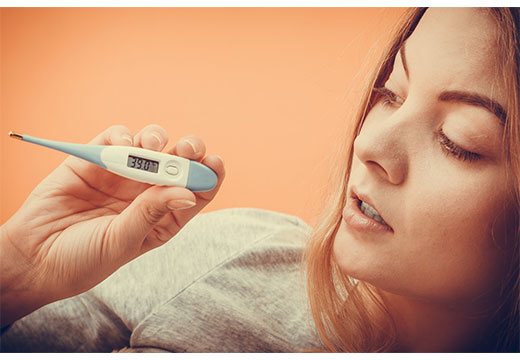
Diagnostics
Only through diagnostics does a specialist determine the cause of the disease.
This event includes:
- Anamnesis collection. The doctor asks the patient about his condition and so on, in order to determine when and how the infection was acquired.
- Laboratory research. The patient undergoes stool and blood tests. This allows you to determine the presence of an inflammatory process.
- Ultrasound diagnostics. It is necessary to determine the condition of the abdominal organs.
- Rectal temperature measurement. It is particularly effective in detecting appendicitis.
- Crops of biological material. Thanks to them, the doctor determines the infectious nature of the disease.
Treatment methods for diarrhea with fever
Diarrhea with fever in an adult requires an integrated approach; treatment should influence the source that provoked the development of the condition. In most cases, drug therapy is carried out. Sometimes (as with appendicitis) surgery is required.
After a diagnostic examination, which includes specialized procedures and laboratory testing, the root cause of the ailment is eliminated.
The second stage is treatment of associated symptoms.
Hyperthermia is eliminated with the help of antipyretics. The most effective for adults are:
- Ibuprofen;
- Paracetamol;
- Analgin;
- Acetylsalicylic acid;
- Diclofenac.
It is better for children to take Ibuprofen and Paracetamol. In certain cases, Analdim (Analgin + Diphenhydramine) injections are given.
For diarrhea, medications of several groups are used: sorbents, probiotics, antibiotics, antidiarrheals. The first - activated carbon, Smecta, Polysorb - remove toxic substances from the body. The second ones - Bifidumbacterin, Lactovit, Lactulose, Yogurt - normalize the state of the intestinal microflora and fight pathogenic pathogens. Taking antibiotics - Levomycetin, Metronidazole, Nifuroxazide - is needed to treat bacterial diarrhea. The last group of drugs - Enterobene, Loperamide - works to reduce intestinal motor function, strengthen sphincter tone, and allows you to treat loose stools.
To generally strengthen the body, the patient is prescribed a special diet, including “astringent” foods. It wouldn’t hurt to use folk recipes in combination with traditional medicine.
Departure
Intoxication (poisoning) of the body provokes it to quickly get rid of harmful substances and poisons that have entered the digestive tract. Excess junk food complicates the work of the stomach. In addition, it tires the entire body. Frequent consumption of fried foods, salty or spicy foods leads to clogging of the body with harmful substances and increases the load on the gastrointestinal tract. Alcohol poisoning in an adult also provokes diarrhea, nausea and weakness.
Poor quality and spoiled food or contaminated water often serves as a source of waste and toxins that the body receives. The first thing that is observed in a child in this case is serious defecation disorders. You can be poisoned not only by food, but also by medicines, carbon monoxide, and chemicals.
Diarrhea and vomiting are quite dangerous conditions. Dehydration begins, and valuable substances such as magnesium and calcium are removed from the body.
First aid for poisoning
If a person is poisoned, it is important to quickly determine what became the source of the toxins and then provide first aid. Severe intoxication may result from consuming stale food.
First aid is provided in the following order:
- provoke the victim to vomit;
- call an ambulance;
At the same time, it is forbidden to induce vomiting in a patient if he is unconscious, or to leave him alone.
In case of an overdose of painkillers or antipyretics, the excitation-inhibition processes are disrupted. Weakness and drowsiness occur, and dizziness may occur. First aid:
- call an ambulance;
- induce vomiting in the patient;
- give activated carbon;
- If there is no heartbeat or breathing, a complex of resuscitation measures must be performed.
In case of poisoning with sleeping pills or alcohol overdose, the following procedures are carried out:
- rinse the victim’s stomach;
- If breathing is impaired, perform artificial respiration.
In case of food poisoning, you must:
- rinse the stomach;
- To remove the remains of infected foods from the intestines, it is worth giving the patient gastric charcoal (carbolene), as well as a laxative.
- As soon as gastric lavage is completed, the patient should be given coffee or tea.
In case of poisoning, you must call a doctor. This will allow you to avoid more serious consequences, find out the causes and begin treatment.
When to see a doctor
Self-medication does not always give a positive result. You should consult a doctor if:
- with dehydration: dry skin, rare frequency of urination, dark urine, a strong feeling of thirst, an incomprehensible kind of discomfort in the heart area;
- frequent diarrhea / vomiting with impurities / interspersed with blood;
- febrile state / temperature rises +37˚С or does not subside for 2 days.
Usually, upon arrival of the emergency room (ambulance), the sick person is sent to the inpatient department of the hospital.
Prevention
To prevent weakness, fever, diarrhea and vomiting, you need to follow simple but effective rules of prevention:
- When preparing food, observe the shelf life of products;
- Avoid self-treatment with antibiotics;
- store ingredients only in the refrigerator in compliance with the commodity proximity, do not keep raw meat next to fresh vegetables;
- choose only high-quality food products, without expired expiration dates;
- do not eat raw fish in rolls, cook steaks without blood, do not drink unpasteurized milk, untested water;
- wash your hands more often;
- eliminate insects in the kitchen;
- wash dishes thoroughly.
source
